Australia
 for some violence, a scene of sensuality, and brief strong language.
for some violence, a scene of sensuality, and brief strong language.
Reviewed by: Misty Wagner
CONTRIBUTOR
| Moral Rating: | Offensive |
| Moviemaking Quality: |
|
| Primary Audience: | Adults Teens |
| Genre: | War Action Romance Western Adventure Drama |
| Length: | 2 hr. 45 min. |
| Year of Release: | 2008 |
| USA Release: |
November 26, 2008 DVD: March 3, 2009 |
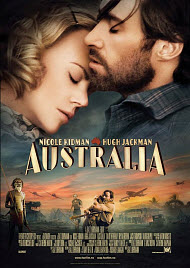
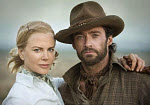
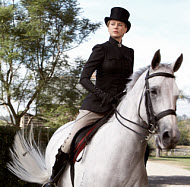
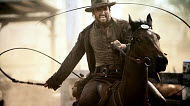
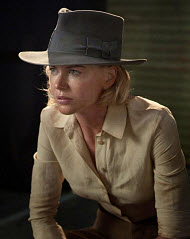
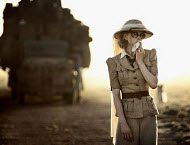
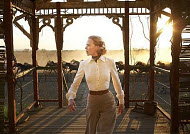
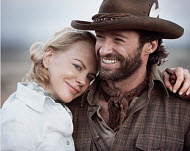
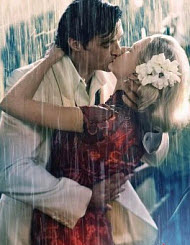
What is true love and how do you know when you have found it? Answer
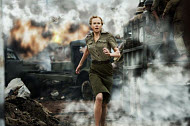
Fear, Anxiety and Worry… What does the Bible say? Answer
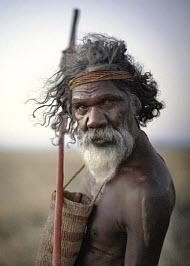
What are the consequences of racial prejudice and false beliefs about the origin of races? Answer
| Featuring |
|---|
|
Hugh Jackman Nicole Kidman Ben Mendelsohn See all » |
| Director |
|
Baz Luhrmann |
| Producer |
|
Bazmark Films Twentieth Century-Fox Film Corporation Baz Luhrmann See all » |
| Distributor |
Sarah Ashley (Nicole Kidman) is an English Aristocrat who spends her days among society and riding her horse amongst her illustrious estate. For some time now, her husband has been down under, at their Australian cattle farm aptly named Faraway Downs. Certain that it is excuses he presents to her for holding on to the Australian property and not returning home, Sarah believes that he is instead attempting to cover up an adulterous relationship. With World War Two taking it’s toll on the world’s economy, Sarah decides to venture down to Faraway Downs herself, confront her husband and talk him into selling the property. Once there, however, Sarah finds that things are far worse than even her husband could have predicted.
With the help of a well experienced drover (an individual, similar to a cowboy, who herds animals over long distances) played by Hugh Jackman, and a recently orphaned bi-racial aborigine boy, Sarah sets out to rejuvenate Faraway Downs.
“Australia” confronts several important pieces of Australian history. The most consistently portrayed is that of the Indigenous Australian’s Stolen Generation. From a period beginning in the mid 1800’s and extending until 1973, the government strongly practiced the removal of Aborigine children from their families, and most often times put them into the practice of slavery for the wealthy whites of the nation. Not only was aboriginal racism prevalent, but often times Aborigine women were allowed to be possessed and taken by men whenever they chose. In regards to cattle droving, quite often the men would shave the heads of Aborigine women and dress them as men, for the purpose of having these women available sexually for the duration of the trip. A large percentage of these children taken were the products of such circumstances.
The other key part of this film’s historical retelling is that on February 19, 1942, Darwin, Australia was attacked by Japanese forces. These attacks were orchestrated by the same man who led the attacks on Pearl Harbor, two and a half months before. These attacks involved 188 attack aircraft and 54 land-based bombers.
Negatives
There is a slight scattering of profanity, with one (that I recall) blatant use of the F-word. There is an implied sex scene which does, briefly, display quite a bit of skin. Throughout many scenes involving Aborigines, their authentically accurate apparel doesn’t leave much to the imagination—often revealing completely unclothed backsides.
There are several scenes of injury, violence, war or murder. Though not overly graphic, there is still some gruesome imagery.
As with any other Baz Luhrmann film, the message derived from “Australia” is solely dependent upon the viewer. Baz made it clear, from the beginning, that the telling of the story of this stolen generation was very much at the heart of his movie. As I watched, (and criticized) the story’s unfolding, the one theme which seemed to make itself most noticeable to me was that of home and belonging. Home could be anything, from a structure where one lives to a tribe where one comes from. Home could be the love between two people, or the maternal bond between a woman and child. As this film addresses, again and again, the racial and bi-racial issues of historic Australia—we are shown that belonging doesn’t have as much to do with biological or tribal connection as it has to do with love, sacrifice and acceptance. There is a popular saying which states “Home is where your story begins,” and as the characters of this movie tell their story, it is quite clear to see that in many ways our own stories are our homes.
In an utterly vibrant and beautiful way, the audience is shown an epic film filled with tragedy, truth, unfairness, redemption, hope, sacrifice, loyalty and love. It would be nearly impossible for anyone to walk away from this film without something worth holding onto.
Violence: Heavy / Profanity: Moderate / Sex/Nudity: Heavy
See list of Relevant Issues—questions-and-answers.


The scenery is beautiful and I loved King George and Nullah’s performances. Morally, nothing bothered me, but some people might be bothered by the rough characters who say “bloody” and swear a bit. No graphic sex scenes or graphic violence (though there is some in war scenes).
Moral rating: Average / Moviemaking quality: 4
The ending of the film seemed very pro-Christian to me as the verse from Matthew 16:26 states, 'For what profit is it to a man if he gains the whole world, and loses his own soul? Or what will a man give in exchange for his soul?'
Moral rating: Average / Moviemaking quality: 4
Moral rating: Excellent! / Moviemaking quality: 4½
Moral rating: Better than Average / Moviemaking quality: 5
I was, however, surprised to see that the reviewer made very little mention of the film’s one obvious flaw, from a Christian standpoint: that an unmarried man and woman live together. This is different from an isolated “sex scene”—it is implied that they continue to live together and engage in intimate relations for the course of several years.
It is even commented on directly by the characters at one point—I don’t remember the exact wording, but they are discussing the townspeople’s censorship of people who associate with “the natives” or unmarried couples who live together. The two “taboos” are presented together as abhorrent and narrow-minded views. For Christian parents who are trying to determine this film’s suitability for children, this is worth mentioning.
That said, I still loved the film, and it does make a number of fantastic, biblically-grounded points for unconditional love and against racial discrimination. But think about your kids—be certain that they are mature enough to sort the moral messages from the immoral ones.
Moral rating: Average / Moviemaking quality: 5
Some areas of concern are a stampede early in the film, accurate costumes of the Aboriginal people (listed above), violence of the war and people killed in the process, and a love scene involving the two main characters.
Moral rating: Better than Average / Moviemaking quality: 5
Moral rating: Average / Moviemaking quality: 4
I gave it a better than average rating because the romance between Nicole Kidman and Hugh Jackman results in a sexual relationship outside of marriage. But the one scene in the movie where there is nudity was not offensive. I do not condone sex outside of marriage, but so many movies are so blatant with repetitive nudity and long scenes that I do find very offensive. The focus of this movie is not on the sex. Therefore, I do recommend this movie for adults and mature teens.
Moral rating: Better than Average / Moviemaking quality: 4
Morally, the use of one nasty piece of bad language and the relationship between the main actors was unfortunate and did sour the movie to some degree. But an epic none the less.
Moral rating: Average / Moviemaking quality: 5
As for the one really offensive word, I have a different take on it from most other reviewers. No, I wouldn’t have liked my 13 yr. old son to hear it (or see the “love scene”), nor would I bring him to a PG-13 movie without viewing it first or reading trusted reviews. However, I understood the context of the word. The situation was highly charged, and the character on the receiving end deserved the utmost contempt. The drover certainly was not portrayed as being a Christian, or even a refined gentleman from whom less coarse language would be expected. Therefore, I didn’t feel it was gratuitous or out of place, and wasn’t as offended as I would ordinarily be. And I was pleasantly surprised that there weren’t more instances of the same as there are in most movies nowadays.
So—it was a funny, sad, exciting, epic movie about the power of love, with a touch of fantasy thrown in. Go see it!
Moral rating: Better than Average / Moviemaking quality: 4½
As for people who are looking for a “totally clean” movie (without fornication, violence, war, historical wrongs, etc.) maybe they need to read the Bible. That brings me to the limitations of this movie (“Australia”) and many others. There is a definite lack of prayer and faith in God in these movies (even from the so-called men of God). “Ought to obey God rather than men.” Though surprisingly, in this movie, there is some mild faith in God from a “religiously dressed” man (that we are to assume is a believer by his dress and demeanor) near the end of the movie (in the course of saving the children from certain death).
My final word: If you are “enticed” to watch a Hollywood-made movie, from time to time, there are far worse choices (and this movie SHOULD NOT be grouped with them in the offensive category).
Moral rating: Better than Average / Moviemaking quality: 4½
To those who are upset about the portrayal of magic practiced by the aborigines, they need to realise that it is good for Christians to be aware of the traditions of the many people in the world. We should be uncompromising in our theological convictions, but a knowledge of these things can help us in witnessing to these people. Often Christians have not been culturally sensitive, which has led to many thinking of Christianity as a Western religion and a cultural import. We can accept the non-sinful elements of the many cultures in the world while rejecting the idolatry that may be at their heart. The Bible says that the nations will bring their glory and honor (the kaleidoscope of cultures and traditions) into the heavenly city New Jerusalem (Revelation 21:24).See all »
Moral rating: Better than Average / Moviemaking quality: 4½
Moral rating: Average / Moviemaking quality: 4½
Moral rating: Offensive / Moviemaking quality: 3
Moral rating: Offensive / Moviemaking quality: 4
Moral rating: Extremely Offensive / Moviemaking quality: 4
Not to take away from the beauty of the photography and CGI and importance of the trials of the mixed aboriginal children, but seeing as he is bent on I am different, accept me as a political point of view savvy viewers can see why he wrote it from the kid’s point of view and left all the good and bad adults as mere caricatures.
Moral rating: Offensive / Moviemaking quality: 2
Moral rating: Offensive / Moviemaking quality: 4½
Moral rating: Average / Moviemaking quality: 3½
All around, I would recommend this movie to anyone over about 13 (who knows not to say those certain words) with 5 stars. But you have to watch the whole movie! Just seeing the beginning is totally misleading! All around it is one of the best new movies that I am aware of….
Moral rating: Better than Average / Moviemaking quality: 4½

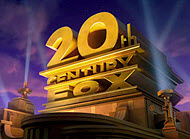
My Ratings: Moral rating: Better than Average / Moviemaking quality: 5